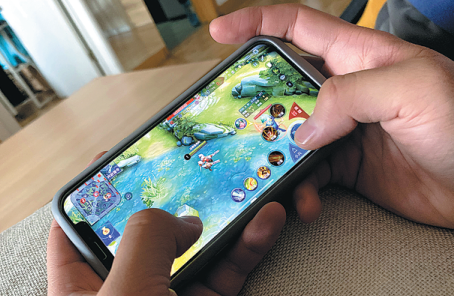Innovation helps conquer boredom at home
2020-02-14 China Daily Editor:Gu Liping
A family in Chongqing exercises at home. WANG QUANCHAO/XINHUA
With plenty of time at home on his hands during the extended Spring Festival break, Leng Yang came up with an innovative idea involving the use of shells from popular Lunar New Year snacks such as pistachios and almonds, along with sunflower seeds.
The 30-year-old designer from Weifang, Shandong province, spent three days making a figure of Mickey Mouse. A video of him putting the artwork together has been viewed more than 100 million times online.
Leng said on the video: "Give shells a new lease on life. Salute to the Year of the Rat," adding that he decided to make the figure in an attempt to beat boredom.
He was unable to meet friends over Spring Festival due to the novel coronavirus pneumonia outbreak, but chose to share his work with millions of netizens on social media platforms such as Sina Weibo and Douyin.
Inspired by his efforts, many kindergarten students have been asked by their teachers to use shells to create such figures.
Leng is not the only one to come up with creative ways to pass the time during the outbreak.
Cheng Dadu, from Xi'an, Shaanxi province, who enjoys running marathons, posted footage on Weibo of himself running barefoot for 10 hours in his living room. Since Jan 30, he has run about 100 kilometers every day indoors.
"Staying at home and keeping healthy are the best ways to fight the virus," he said.
As of Wednesday, the hashtag "Innovative ways to combat boredom at home" had been viewed more than 300 million times on Weibo.
As people have had limited contact with friends and neighbors, the use of cyberspace has surged.
As former Morgan Stanley employee Duncan Clark writes in his book Alibaba: The House That Jack Ma Built, "SARS validated digital mobile telephony and the internet, and so came to represent the turning point when the internet emerged as a truly mass medium in China."
In 2003, when the outbreak of severe acute respiratory syndrome in China had been brought under control, e-commerce platforms Taobao and JD were launched along with Tencent's QQ Game. They all grew to become internet giants.
Industry experts estimate that the ongoing outbreak will result in another internet boom.
On Feb 3, at a news conference on the economic impact of the outbreak, Lian Weiliang, vice-minister of the National Development and Reform Commission, said, "Online entertainment and shopping remain very active."
Wang Jianhui, a media and internet analyst at Cinda Securities, said," During the outbreak, the online entertainment sector-dominated by games and streaming services-has seen a welcome boom."
In addition to the lockdown in Wuhan, Hubei province, the epicenter of the outbreak, the central government has imposed preventive measures in metropolitan areas such as Beijing and Shanghai as well as other populous areas. Public celebrations nationwide have been canceled.
With the government suggesting that people stay at home to avoid further spreading the virus, lifestyles have moved increasingly from offline to online.
In June, the number of netizens in China reached 854 million, accounting for 61.2 percent of the population, according to a report from the China Internet Network Information Center.

A Beijing resident plays Tencent Games' Honor of Kings at home. DU LIANYI/CHINA DAILY
Online games
Online games and streaming apps have seen millions of views and downloads as demand for home entertainment has soared.
According to Tencent Games, Honor of Kings earned about 2 billion yuan ($288 million)-a record high-on Jan 24, Lunar New Year's Eve. Industry experts estimate that the game made more than 9 billion yuan last month due to the increasing number of participants and longer playing times during the outbreak.
The strategy game Plague Inc., from the United Kingdom, went viral after the outbreak. Since Jan 21, it has been one of China's most downloaded apps, according to mobile data and analytics platform App Annie.
Developed in 2012 by Ndemic Creation, the game demonstrates how a pathogen evolves and infects people.
In 2013, James Vaughan, the game's developer, said it can serve "as a tool to teach the public about outbreaks and disease transmission."
Last month, the game generated 78,000 downloads, up from 16,000 in December, according to market analyst Sensor Tower.
One player commented," I learned a lot from playing the game, including how the virus spreads and the measures that can be taken to better prevent and contain the epidemic."
Amid a surge in players, Ndemic Creations has reminded them that Plague Inc. is not a "scientific model" and that people wanting information on the outbreak should obtain it from health authorities.
"Many students played the game over the extended Spring Festival break," said Li Ding, a college teacher in Shenyang, Liaoning province, adding that she spent more than five hours on the internet each day.
In an attempt to stop large numbers of people gathering, officials have banned outdoor games of mahjong, chess and cards and have used drones for virus patrols. As a result, demand for online games has surged.
According to online data service provider Qimai Technology, since Jan 27, Tencent's Happy Mahjong has remained in top place in the download rankings for chess and card games, followed by Fight the Landlord, a card game also developed by Tencent.
An ad from the company reads: "Less outings, more company. Join us and play mahjong and cards with friends at home."
To attract users, special free online rooms opened for Happy Mahjong and Fight the Landlord from Feb 1 to Feb 9.
Zhao Kun, a Shanghai insurance agent, said: "My screen time recently has exceeded 12 hours a day. There's nothing I can do, but play games, binge-watch and surf the internet."

The Mickey Mouse figure made by Leng Yang from Weifang, Shandong province. CHINA DAILY
Video platforms
In addition to online games, demand has risen for video apps as sources of entertainment and information.
With movie theaters nationwide closed due to the outbreak, on Jan 24, Lost in Russia became the first Chinese film intended for theatrical release to premiere online. It debuted for free on Huanxi Media's streaming service and on platforms owned by ByteDance.
Directed by and starring Xu Zheng, the comedy was due to be released in theaters on Jan 25. It portrays the journey through Russia of a manipulative mother and her middle-aged son who wants to rebel and escape her smothering influence.
According to a stock exchange filing, ByteDance has agreed to pay Huanxi Media 630 million yuan to stream the movie and to later jointly launch a film channel.
Data from App Annie show that weekly downloads on ByteDance's Xigua video app rose by 77 percent from Jan 20 to Jan 26.
According to digital marketing agency Techweb, in the three days after it debuted, Lost in Russia notched up some 600 million views and was watched by more than 180 million households.
Many viewers commented: "Thank you very much, I owe you a movie ticket."
ByteDance has been streaming longer content, with the addition of 13 movies from Huanxi Media across its platforms.
Enter the Fat Dragon was the second film after Lost in Russia to be released on streaming platforms during Spring Festival, debuting on Feb 1.
According to its production company, Bona Film Group, the Hong Kong action movie premiered on streaming sites iQiyi and Tencent Video. Starring Donnie Yen, it was scheduled to hit theaters on Feb 16.It is available on iQiyi and Tencent Video's subscriber-only VIP Early-Access on-Demand service.
The movie has been viewed more than 40 million times on Tencent Video.
Although people confined to home have embraced online streaming, theater owners and studios have voiced concern that the trend could have a significant impact on China's film sector. They said this could be comparable to the "disruption" brought to Hollywood by Netflix, which has resulted in new productions skipping theatrical release and going straight to streaming.
Lessons livestreamed
Many universities and other academic institutions have been livestreaming lessons, while video apps, such as Bilibili, Kuaishou and Douyin, plan to offer a range of classes to the public.
From Feb 3 to 7, Tsinghua University livestreamed five open classes on Douyin, covering international relations, public speaking, traditional culture, interpersonal relations and dance appreciation.
An open lecture given on Feb 5 by Yan Xuetong, director of The Institute of International Studies at Tsinghua University, attracted about 160,000 viewers. Since the novel coronavirus outbreak, Yan has analyzed reaction from the international community.
On Feb 5, Peking University launched open classes on Douyin and Bilbili.
Coronavirus-related searches and hashtags have topped trending lists on Douyin and Kuaishou. Both apps have launched channels devoted to virus-related news, live updates and expert analysis.
Xie Bin, an expert at the Shanghai Mental Health Center, suggested that people should avoid searching for information about the virus, which could increase their anxiety levels.
Fitness apps
The closure of gyms across the country has seen exercise addicts turn to fitness apps, with classes being livestreamed.
Mobile fitness community Keep used Douyin to broadcast its classes online, hosting three livestreaming sessions a day. Although the classes are free to view, the Keep instructor asks participants make comments and "like" the broadcasts.
Sun Feifei, an information technology engineer in Beijing, said she followed the classes every day during the Spring Festival holiday. "Exercise is part of my life, no matter what happens. Thanks to the internet, I can watch Keep classes at home during self-quarantine," she said.
On Jan 27, digital fitness and wellness brand Lefit launched a public exercise campaign. In cooperation with short video platforms, including Kuaishou and Douyin, the fitness startup, based in Hangzhou, Zhejiang province, has uploaded more than 16,000 video clips to instruct people on exercising at home. The clips have been viewed more than 270 million times.
On Jan 30, the General Administration of Sport of China issued a notice, calling on sports departments at all levels to promote "simple and scientific" exercises at home, introduce "fitness knowledge" and advocate healthy lifestyles via television and the internet during the epidemic.
Some leading athletes, including former diving champion Gao Min, swimmer Sun Yang and ultra-marathon runner Chen Penbin have posted videos on social media showing their workout routines and offering advice for those exercising at home.
In her video, Gao said people can "gain strength from sports to overcome the pandemic".
To combat boredom at home, people nationwide are becoming increasingly creative, with videos posted on social media ranging from footage of fishing in an indoor tank to playing ping pong on a dining table.
Cao Qian, a librarian in Yantai, Shandong, used water bottles as quoits to play with her 7-year-old daughter.
"The game had all the family laughing, which I will long remember after all we have gone through," Cao said.
A video on Weibo showed patients with mild symptoms of the virus dancing at a temporary hospital in Wuhan on Feb 10.
Yan Hao, a doctor at the hospital, who is encouraging patients to take part in dancing to relieve their anxiety, said: "Confidence is our 'sunshine'. It is important to help the patients to build their confidence and defeat the disease."
On Tuesday evening, many thousands of people nationwide discovered a novel form of entertainment when the Broom Challenge went viral on Chinese social media platforms. Netizens posted pictures and video footage of brooms standing upright, unaided.
The participants were responding to a rumor that NASA had said that Feb 11 was the only day the standing broom trick would work, because the Earth was at a perfect tilt. They spent many hours making brooms stand up unaided.
Gu Yanfeng, 41, a mother of two in Beijing who posted pictures on WeChat Moments of a broom standing up, said, "I didn't believe it at first, but it really did happen."
NASA later took to social media, stating, "There's no 'special gravity' that only affects brooms, but the moon's gravity creates tides on Earth."



